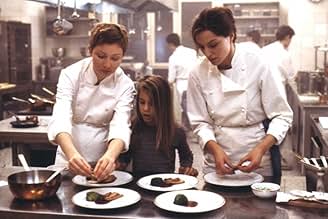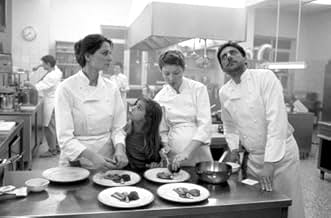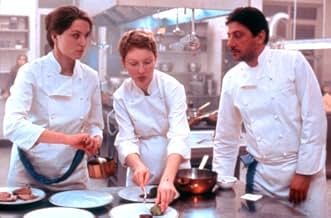AVALIAÇÃO DA IMDb
7,2/10
8,8 mil
SUA AVALIAÇÃO
Adicionar um enredo no seu idiomaWhen a headstrong chef takes charge of her equally stubborn 8-year-old niece, the tensions between them mount... until an Italian sous-chef arrives to lighten the mood.When a headstrong chef takes charge of her equally stubborn 8-year-old niece, the tensions between them mount... until an Italian sous-chef arrives to lighten the mood.When a headstrong chef takes charge of her equally stubborn 8-year-old niece, the tensions between them mount... until an Italian sous-chef arrives to lighten the mood.
- Direção
- Roteirista
- Artistas
- Prêmios
- 14 vitórias e 7 indicações no total
Wolf-Dietrich Sprenger
- Lauter Gast
- (as W.D. Sprenger)
Victoria Trauttmansdorff
- Begleiterin
- (as Victoria von Trautmannsdorf)
Jerome Ducornau
- Jean
- (as Jerome Ducournau)
Avaliações em destaque
You have it now. Buy, don't rent this film. It's a keeper. Most notable and with great kudos to the director, the films stays true to itself almost all the way through. Far enough to beat out most other films. There are a few quibbles toward the end of the film, but not enough to shake off the aura it imparts just giving yourself over to its story.
The camera moves efficiently and cleanly throughout the film, and the actors respond with clean understated action and dialog.
The story is spare, and I found what I think is a clue to the writer's intention, as the protagonist describes the menu purpose of "Fish in Butter and Basil sauce." Listen for it and see if you don't agree, she is speaking to us about her story/film.
To own this is, like Nurse Betty, to own something you just have to pull out and watch a couple of times a year. just because they're so darn good.
No wonder the folks in H'wood are busy at making an American version for 2007.
The camera moves efficiently and cleanly throughout the film, and the actors respond with clean understated action and dialog.
The story is spare, and I found what I think is a clue to the writer's intention, as the protagonist describes the menu purpose of "Fish in Butter and Basil sauce." Listen for it and see if you don't agree, she is speaking to us about her story/film.
To own this is, like Nurse Betty, to own something you just have to pull out and watch a couple of times a year. just because they're so darn good.
No wonder the folks in H'wood are busy at making an American version for 2007.
Greetings again from the darkness. Nothing (well very few things) irritates me more than a marketing campaign that misrepresents the movie. The trailer I saw 2 months ago, led me to believe that this was a comedy, in fact, almost a slapstick comedy. PLEASE don't go to this movie expecting a comedy. There are a few laughs, but mostly just a few smiles and chuckles. This wonderful film offers so much other than comedy. Veteran German actress Martina Gedeck is just outstanding as Martha - a beautiful woman comfortable only while cooking ... and then just barely. Most of the movie deals with Martha's struggle at being a mom to her 8 year old niece AND having to share her kitchen with a talented "Italian" chef. Watching these 3 grow is painful, yet fulfilling. Watch for the changes in Martha's approach to food and life as Mario shows her the warmth and emotions of both. This is a coming of age film for an older woman. "My Big Fat Greek Wedding" had been my favorite little movie of the year. Now it is not so little, and "Mostly Martha" may be every bit as good. Just don't expect a laugh out loud comedy.
(spoiler regarding the general plot)
Bella Martha reminds me of About A Boy, the "no man is an island" aspect of it. In some ways, Martha is like the guy played by Hugh Grant. The difference though is that while he apparently is really happy about the state of affairs, i.e. the isolation, she is not (even if she may not be fully aware of her own unhappiness). She has to visit a therapist regularly, although she claims that this is purely on instruction of her boss. I call this visit the first of the four "relationships" just to make the number sound more interesting.
The other three relationship all start to develop quite early in the film. First, a neighbour moves in, a gentlemanly engineer called Sam. Then in her "office" i.e. the kitchen of a restaurant where she is the chef, a chap called Mario is brought in by her boss as temporary relief for her assistant on maternity leave. Finally, death of her single-parent sister in an accident left her taking care of her eight-year-old niece Lina while they search her father in Italy.
The first half of the film developed these three relationships along the two fronts: home and office. Soon, it is clear that Sam's role is not really significant, serving just as a dependable friend and emergency-baby-sitter. On the other hand, rocky starts of the other two relationships smooth out as the two fronts merge. Lina comes to the restaurant kitchen in the evenings, becoming a darling there, while Mario becomes a family friend and Lina's buddy, and the three look just like a family. We begin to see smiles on Martha's face.
As in similar movies, just after the mid-point, when characters are well developed and things go nicely, conflicts occur. What I found is that the hostility of Lina towards Martha is less than convincing, even if we take into account her possible rejection of Martha as a mother-substitution. The eventual reconciliation also comes a little too easily. The other conflicts, on which I won't go into details, are not that well developed.
But that is exactly the main point. This is not a Hollywood movie with the standard formula of powerful dramatic conflicts and climatic tear-jerking conclusions. This point is well made when we see the ending of the story given to us quite casually as part of the credit roll. Oh yes, there's a concluding scene with the therapist, reminding us of the sense of humour that comes as part of the film.
Smooth jazz (not sure if that's the right terminology) has been used throughout the film, at the right times, enhancing it rather than distracting from it.
Finally, I really love the scenes in the kitchen which is Martha's entire universe at the beginning of the film, as well as where her reconciliation with both Mario and Lina first takes place. The story aside, I really enjoy the operation in the kitchen, which is the exact opposite to the mass production lines brought about by the industrial revolution. Here, in Martha's kitchen, things are done with what I can only describe as artistic flair.
Bella Martha reminds me of About A Boy, the "no man is an island" aspect of it. In some ways, Martha is like the guy played by Hugh Grant. The difference though is that while he apparently is really happy about the state of affairs, i.e. the isolation, she is not (even if she may not be fully aware of her own unhappiness). She has to visit a therapist regularly, although she claims that this is purely on instruction of her boss. I call this visit the first of the four "relationships" just to make the number sound more interesting.
The other three relationship all start to develop quite early in the film. First, a neighbour moves in, a gentlemanly engineer called Sam. Then in her "office" i.e. the kitchen of a restaurant where she is the chef, a chap called Mario is brought in by her boss as temporary relief for her assistant on maternity leave. Finally, death of her single-parent sister in an accident left her taking care of her eight-year-old niece Lina while they search her father in Italy.
The first half of the film developed these three relationships along the two fronts: home and office. Soon, it is clear that Sam's role is not really significant, serving just as a dependable friend and emergency-baby-sitter. On the other hand, rocky starts of the other two relationships smooth out as the two fronts merge. Lina comes to the restaurant kitchen in the evenings, becoming a darling there, while Mario becomes a family friend and Lina's buddy, and the three look just like a family. We begin to see smiles on Martha's face.
As in similar movies, just after the mid-point, when characters are well developed and things go nicely, conflicts occur. What I found is that the hostility of Lina towards Martha is less than convincing, even if we take into account her possible rejection of Martha as a mother-substitution. The eventual reconciliation also comes a little too easily. The other conflicts, on which I won't go into details, are not that well developed.
But that is exactly the main point. This is not a Hollywood movie with the standard formula of powerful dramatic conflicts and climatic tear-jerking conclusions. This point is well made when we see the ending of the story given to us quite casually as part of the credit roll. Oh yes, there's a concluding scene with the therapist, reminding us of the sense of humour that comes as part of the film.
Smooth jazz (not sure if that's the right terminology) has been used throughout the film, at the right times, enhancing it rather than distracting from it.
Finally, I really love the scenes in the kitchen which is Martha's entire universe at the beginning of the film, as well as where her reconciliation with both Mario and Lina first takes place. The story aside, I really enjoy the operation in the kitchen, which is the exact opposite to the mass production lines brought about by the industrial revolution. Here, in Martha's kitchen, things are done with what I can only describe as artistic flair.
8=G=
"Mostly Martha" is a thoroughly delightful tale of a comely, self contained, socially unassured, and occasionally gauche German master chef, Martha (Gedeck), in need of a recipe for living who finds love through tragedy and romance through cooking. In thinking about these comments I concluded that there is nothing I would change about this film except the language (I don't speak German). A perfect little gem, "Mostly Martha" is the kind of flick which makes you feel sorry for those who won't watch foreign films because of subtitles and wonder why audiences dine voraciously on cinematic junk food when such palate pleasers as this are not only delicious but nutritious. (A-)
The charms outweigh the clichés in "Mostly Martha (Bella Martha)." Of course it's right away different in that the phrase "German romantic comedy" isn't common and can be applied here.
I loved that "Martha" herself is a competent, self-possessed professional and that's what attracts the guy to her. While we first meet her in therapy, her problems are those of work and personal life I could certainly relate to.
While this will remind others of food prep movies like "Wedding Banquet," "Eat, Drink, Man, Woman," and "Tortilla Soup" or restaurant movies like "Dinner Rush" and "Big Night," (which all had male chefs), or "Babette's Feast," I have zero interest in cooking so cared only that "Martha" is very good at her job and at managing the restaurant kitchen.
The restaurant characters seem like real co-workers, and amazingly the niece is not some adorable child actor but seems like a real kid whose surliness is legit.
The Italian sous chef who comes on board brings the sensuality of the Mediterranean --in music (with a generous use of Paolo Conte songs), movement and language much like in the Danish "Italian for Beginners."
And of course in romance, which is still delightful even as the clichés start appearing, her happiness is indicated by her loosened hair like Jane Fonda's in "Electric Horseman."
But I enjoyed the build-up to their relationship in ever longer, longing glances and their mutual professional respect and concluding compromises.
(originally written 9/2/2002)
I loved that "Martha" herself is a competent, self-possessed professional and that's what attracts the guy to her. While we first meet her in therapy, her problems are those of work and personal life I could certainly relate to.
While this will remind others of food prep movies like "Wedding Banquet," "Eat, Drink, Man, Woman," and "Tortilla Soup" or restaurant movies like "Dinner Rush" and "Big Night," (which all had male chefs), or "Babette's Feast," I have zero interest in cooking so cared only that "Martha" is very good at her job and at managing the restaurant kitchen.
The restaurant characters seem like real co-workers, and amazingly the niece is not some adorable child actor but seems like a real kid whose surliness is legit.
The Italian sous chef who comes on board brings the sensuality of the Mediterranean --in music (with a generous use of Paolo Conte songs), movement and language much like in the Danish "Italian for Beginners."
And of course in romance, which is still delightful even as the clichés start appearing, her happiness is indicated by her loosened hair like Jane Fonda's in "Electric Horseman."
But I enjoyed the build-up to their relationship in ever longer, longing glances and their mutual professional respect and concluding compromises.
(originally written 9/2/2002)
Você sabia?
- CuriosidadesSergio Castellitto's German wasn't good enough so Frank Glaubrecht was brought in to dub his voice for the German version.
- Erros de gravaçãoWhen Mario and Lina get ready to cook dinner at Martha's apartment, Lina puts on her apron twice.
- ConexõesFeatured in Le cinéma passe à table (2005)
- Trilhas sonorasCountry
Written by Keith Jarrett
Performed by Keith Jarrett, Jan Garbarek, Palle Danielsson, Jørn Christensen
ECM Records
Principais escolhas
Faça login para avaliar e ver a lista de recomendações personalizadas
- How long is Mostly Martha?Fornecido pela Alexa
Detalhes
Bilheteria
- Faturamento bruto nos EUA e Canadá
- US$ 4.160.475
- Fim de semana de estreia nos EUA e Canadá
- US$ 40.446
- 18 de ago. de 2002
- Faturamento bruto mundial
- US$ 9.852.022
- Tempo de duração
- 1 h 49 min(109 min)
- Cor
- Mixagem de som
- Proporção
- 1.85 : 1
Contribua para esta página
Sugerir uma alteração ou adicionar conteúdo ausente

![Assistir a Trailer [OV]](https://m.media-amazon.com/images/M/MV5BYmI4MTFiNjAtNzg5ZC00Mjg2LWFhNDYtMTVhYjYyMTM3ZGM5XkEyXkFqcGdeQXRyYW5zY29kZS13b3JrZmxvdw@@._V1_QL75_UX500_CR0)



























